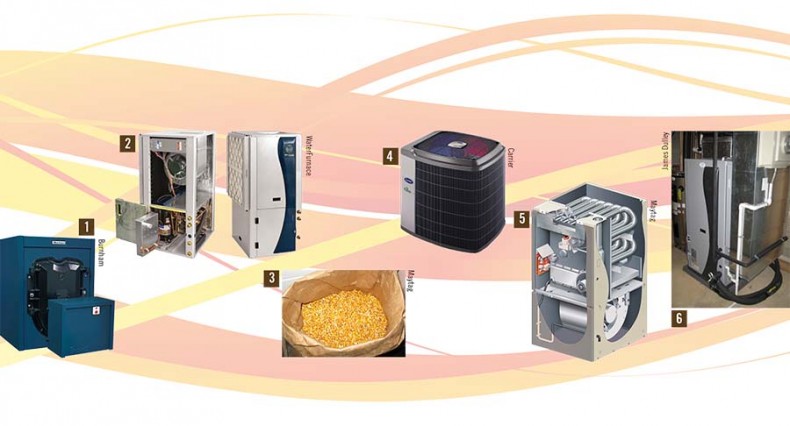Heating systems
Consider fuel costs when mulling choices
By James Dulley- This is a high-efficiency oil boiler for floor radiant or baseboard heating. Gas and propane models are also available.
- A super-efficient geothermal heat pump shown with and without the front cover. Notice the large air cleaner and water fittings for also heating hot water.
- Shelled corn can be burned in corn stoves and some pellet stoves. Corn is one of the least expensive sources of heat for a home.
- This heat pump is used in a hybrid heating/cooling system with a gas, propane or oil furnace.
- This shows the interior of a high-efficiency condensing furnace.
- Variable-speed geothermal heat pump in Dulley’s home uses a horizontal ground loop.
When changing an entire heating and cooling system, you can choose fuel types for heating. But electricity is the only cooling option for an air conditioner or heat pump.
Operating cost and comfort are the primary factors in selecting a new system. Efficiency and relative cost of the various fuels determine the operating cost. Fuel prices can fluctuate dramatically over time, as we have seen recently with fuel oil and propane.
A geothermal heat pump is the most efficient year-round system because it heats and cools using stored heat from the ground. I installed one in my own home last spring. Select a two-speed or variable-speed model for the best comfort. It continuously matches heating and cooling output to the house needs. The initial cost of a geothermal system is substantially more than other complete systems, but the utility bill savings easily pay back its higher cost. Plus, there is a 30 percent federal tax credit for geothermal heat pumps installed before 2017.
If you install a heat pump instead of a central air conditioner only, even if you plan to have a fossil fuel furnace (called a hybrid system), the installed cost is not significantly more expensive and your annual utility bills will be lower. The advantage of a heat pump is it heats very efficiently during mild spring and fall weather. And a heat pump cools as efficiently as a central air conditioner during summer.
If natural gas is available in your area, a condensing furnace generally is the most cost effective choice. With the glut of domestic natural gas now available from the fracking process, there should be an adequate supply at reasonable prices for the foreseeable future. Efficiencies are as high as 97 percent.
A propane or oil furnace also can provide comfortable heating. A propane furnace is almost identical to a gas one, but propane is typically more expensive to use and can be in short supply, as it was several winters ago. Oil is readily available, but oil furnace efficiency is not as high, and these furnaces require substantial maintenance.
You can consider alternative fuels such as firewood, corn, pellets, etc., for supplemental heating. New model burners are convenient to use, and the primary fuel is “renewable.” For example, new dual-fuel wood furnaces automatically switch to gas or propane when the wood burns out overnight.
-
Share this story:




